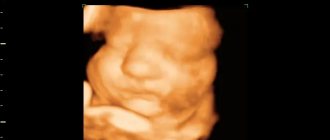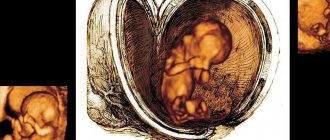Many people like to count. They say that information looks more clear in numbers. Expectant mothers, waiting for the approaching day of birth, also carefully keep track of their weeks and months. Sometimes the following question may arise: “24 weeks of pregnancy – how many months have already passed?” To do this, we will try to figure out how to correctly calculate the gestational age. Firstly, there are obstetric months, which consist of 4 weeks. They begin their counting from the first day of the last menstruation. There are also embryonic periods, which count from the moment of conception. Therefore, the obstetric period is 1.5 - 2 weeks longer than the embryonic period. Typically, gynecologists count weeks based on the timing of menstruation, so the 24th week of pregnancy can be considered the last week of the 6th month of pregnancy.
Interesting Facts
| Options | Indications |
| Time from conception | 22 weeks |
| Period by month | 24 weeks |
| What month | 6 |
| Dimensions and weight of the fetus | 300 mm, 600 g |
| Uterus dimensions | 1-2 cm above the navel or at its level |
| Pregnant weight | Gain from the beginning of pregnancy +4-7 kg; over the last week no more than 400-500 g |
Your baby is the size of
Corn
300mm Size
600 g Weight
At 24 weeks of pregnancy, the baby is about the size of an ear of corn. The internal organs are still visible through his skin, but it is from this week that pigment will begin to form, which will subsequently provide the color and opacity of the skin. This will also contribute to the growth of subcutaneous adipose tissue. The pregnant woman continues to experience lower back pain, false contractions and swelling. We will find out what else happens in the development of the fetus, and how the feelings of the expectant mother change during this period. But first, let's define the calculations:
Deficiency of vitamins and microelements in the second half of pregnancy
Doctors prescribe multivitamins for pregnant women in combination with Omega-3 preparations and vitamin D (in the autumn-winter period). But sometimes such support is not enough, and a pregnant woman is faced with:
- anemia (iron deficiency);
- leg cramps (lack of magnesium and potassium);
- sensitivity of tooth enamel (calcium deficiency).
First of all, it is worth adjusting your diet, focusing on foods rich in the necessary substance. So, a lot of iron is found in:
- boiled beef;
- liver;
- buckwheat;
- pomegranate juice.
Good doses of calcium are found in:
- dairy and fermented milk products;
- fish;
- greenery;
- nuts;
- sesame.
Nutritionists call the best food sources of magnesium and potassium:
- bananas;
- berries;
- legumes and cereals.
Photo gallery of products useful in the second half of pregnancy
Bananas will help enrich the body with potassium
Berries are necessary for a pregnant woman, as they contain a lot of magnesium and potassium, which relieves night cramps.
Cereals and beans will help enrich the body with potassium and magnesium
Dairy and fermented milk products are a source of calcium
Buckwheat is a source of iron
Pomegranate juice is recommended for pregnant women with anemia
Boiled beef contains iron, which is necessary for anemia
Woman's well-being
Weight gain at 24 weeks is normally 8-9 kg, but it all depends on the woman’s physique, hereditary and hormonal factors. The abdomen is rapidly expanding, which can cause the following unpleasant symptoms:
- itching of the skin in the abdomen and thighs - occurs due to the natural stretching of tissues;
- pain in the lower and sides of the abdomen, in the lower back - associated with an increasing load on the ligamentous apparatus of the uterus;
- fatigue, pain in the legs and back - due to a shift in the center of gravity;
- swelling of the legs and arms - appears due to the accumulation of sodium in the blood and soft tissues under the influence of hormonal changes.
There is no need to reduce water consumption during swelling, but salty foods should be limited. Try not to stay on your feet for a long time, in a static position. If the swelling is severe and does not go away by the morning, you should consult a specialist.
Emotional mood
As a rule, by this stage of pregnancy the woman has already fully realized her “interesting situation.” She has accepted her role and is preparing to fulfill the most important mission in her life - to be a mother. And the baby does not allow you to forget about yourself with constant somersaults and pushes from the inside, which bring joy.
It is worth understanding that pregnancy is a difficult period, which may be accompanied by changes in mood. They will be largely due to hormonal changes in the body. Therefore, a feeling of all-encompassing happiness may be replaced by a depressed mood.
In addition, the woman will be tormented by fears and worries about upcoming events in her life. That’s why it’s so important to learn how to deal with them, trying to switch your thoughts to a positive one. It’s good when there is a loved one nearby who helps you cope with negative emotions and understands what is happening to the woman now. You cannot indulge in despair and sadness, especially since there is no reason for this - after all, a new life is maturing inside.
Fetal development
Born at this stage of pregnancy, the baby is considered viable. Survival rate is 50%. The weight of the child at 24 weeks of pregnancy is 600 grams, the height of the fetus is about 30 cm.
He sleeps 16-19 hours a day, the woman may notice alternating regular intervals of his sleep and rest. The size of the uterus still allows him to actively move: he pushes with his legs, grabs the umbilical cord, and tumbles. Various movements give the woman the opportunity to communicate with the child and understand whether everything is okay with him now. So, if movements become noticeably less or they become abrupt, we may be talking about oxygen starvation. Additional diagnostics and specialist assistance are required.
Progress in development
- The eyes react to light: if you bring a lamp to the stomach, the child will begin to turn away and squint.
- The face is fully formed, eyebrows and eyelashes are clearly visible.
- The lungs produce a substance that will help them open after birth.
- The convolutions are formed, the development of the cerebellum and midbrain is completed.
Mother. Changes in the body's condition at 24 weeks
Changes in a woman’s body at 24 weeks of pregnancy
By the 24th week of pregnancy, most women feel satisfactory. Some people are pleasantly surprised by the changes occurring in their appearance: the condition of their nails and hair improves, and they feel a surge of strength. This makes your mood better and more joyful. But the expectation of a miracle at this stage can be spoiled by some symptoms that bring discomfort and sometimes frighten the pregnant woman.
Most often, expectant mothers are concerned about:
- the appearance of edema or rapid weight gain without changing the diet. Edema is the most common pathological process during pregnancy. It is caused by an increase in the amount of blood in a woman's body. The kidneys are forced to work 2 times more: they need to cleanse not only the mother’s body, but also the fetus. When the kidneys fail to remove excess fluid, it begins to accumulate in the body.
A woman may not always notice swelling, and only excessive weight gain can indicate the onset of a pathological process. For this reason, it is recommended to monitor fluctuations in body weight and, if you suspect fluid retention in the body, talk to your gynecologist about your concerns.
Most often, the appearance of edema is easy to notice. If, after sleep or in the evening, a pregnant woman notices that her face is swollen, her fingers have become much thicker, pain has appeared in her legs, their volume has increased significantly, and when pressed, a dimple forms (the skin returns to its original position slowly), then a consultation with a gynecologist is necessary.
The danger of edema at the 24th week of pregnancy is the high probability of late toxicosis in the absence of timely treatment.
- surges in blood pressure. Another common symptom that causes inconvenience and indicates possible complications in late pregnancy. Women with normal blood pressure levels (within 110/70 - 130/90) before pregnancy need to monitor their levels so that they do not exceed 140/90.
For pregnant women with persistent hypotension or hypertension, it is important to monitor readings from their work pressure, reporting to the gynecologist if the values deviate by more than 30 points. If before pregnancy a woman felt normal with indicators of 90/50, then during pregnancy be sure to tell the doctor if they exceed 120/80.
Jumps in blood pressure can be harbingers of late toxicosis and cause many complications of pregnancy and childbirth. With early detection of this pathology, it is possible to reduce the likelihood of undesirable consequences.
- dyspepsia. Heartburn, constipation, increased flatulence, constant heaviness in the stomach are frequent companions of pregnant women at the 24th week. The appearance of such unpleasant sensations will continue until childbirth, so it is advisable for a woman to carefully monitor her diet: select foods that help improve digestion, avoid dishes that are difficult to digest, and try to choose light, healthy foods.
Bowel movements require special attention. A pregnant woman is advised not to delay defecation for more than 2 days, so as not to increase pressure on the pelvic muscles. If the problem of bowel movement cannot be solved by increasing the amount of clean water you drink and introducing dried apricots and prunes into your diet, you should consult a gynecologist. Drug treatment may be prescribed.
- itching in the lower abdomen, along the inner thighs. Active fetal growth at 24 weeks requires the abdominal muscles to quickly stretch. If the elasticity of the skin is low, there is not enough fluid in the cells, the process of increasing the volume of the abdomen can cause severe itching, which intensifies in the evening. Along with unpleasant sensations, unsightly dark stripes (stretch marks) may also appear on the surface of the skin. If itching is a temporary phenomenon, then in most cases stretch marks remain with a woman for life.
Special creams can reduce discomfort and reduce the likelihood of new stretch marks appearing. Before purchasing cosmetic products, it is advisable to consult a gynecologist.
- sleep disturbance. This week, women often complain about deteriorating sleep quality and problems falling asleep. Most often this is caused by changes in figure. At this stage, it is already quite difficult to find a comfortable position for rest, and the fetus, as a rule, begins to become active closer to the night. Frequent urge to go to the toilet and a feeling of hunger can interfere with normal sleep. In some cases, women are faced with all the reasons at once. Relaxing on a hard mattress will help change the situation and improve your sleep. It is more difficult to find a comfortable position in a soft bed;
- ventilate the room before going to bed;
- reducing the amount of liquid you drink 2 hours before bedtime;
- talking with the fetus, singing;
- a small piece of fruit or vegetable eaten in bed;
- using a special pillow for pregnant women that allows you to throw your leg over it. If this option is not available, it is good to place regular pillows under your legs and back.
These simple ways to improve sleep quality help in most cases to normalize your night's rest. If, despite the measures taken, you cannot rest at night, you need to consult a gynecologist. It may be necessary to take additional tests and undergo an examination.
- training contractions . Most often, training contractions begin to appear in the third trimester, but they often occur in the second half of the second trimester. After loading or raising her arms high, a woman begins to feel muscle tension across the entire surface of her abdomen. If this process is painless and goes away after 15-30 minutes of rest, there is no need to worry.
If you experience pain or constant tension in your abdominal muscles, you should immediately seek medical help.
The listed unpleasant sensations may appear in the 24th week of pregnancy in some women. For some they will be temporary, for others they will have to deal with the constant manifestation of several options at once. It must be remembered that each pregnant woman is unique, as is each subsequent pregnancy. It is not necessary that the problems of the first pregnancy will be repeated in the next one, just as it is not a fact that after an ideal first experience, the second one will be as easy.
The variety of manifestations of pregnancy this week is very large, so it is better to tell your gynecologist about any new sensations and changes in the body.
Movements
At the 24th week of pregnancy, a woman should normally be able to feel the fetus tossing and kicking. For some, the baby’s movements around the uterus seem like light and gentle touches, for others it sounds like a clear, persistent knocking in the stomach. Sometimes pain is possible when the fetus is placed with all its weight in the area of the sciatic nerve. Whatever the sensations, they are an indicator of the proper development and formation of the fetus. Now it is easy for the expectant mother to determine the well-being of her baby: when he is active and gradually increases his kicks, everything is fine.
There is no need to count the number of movements yet, but it is worth noting their constancy. At the current stage, the unborn baby sleeps about 19 hours a day, so long breaks in activity are possible. You should worry and seek advice from a gynecologist if there are no movements for more than a day.
Tests and ultrasound
There are no special tests scheduled this week. To assess the health of the woman and fetus, the doctor needs data from a general blood and urine test. For timely diagnosis of gestational diabetes, preeclampsia and other pregnancy complications, you will also need indicators such as abdominal circumference, uterine fundus height and blood pressure.
Ultrasound is not scheduled during this period. As part of prenatal pregnancy screening, it should have been carried out from 18 to 22 weeks. And only if the results were questionable, the gynecologist can prescribe a repeat examination.
School of preparation for childbirth
If the expectant mother has not yet taken a course to prepare for childbirth, now is the time to do so. There:
- will provide comprehensive information on the course of pregnancy, childbirth and the postpartum period;
- will teach you to breathe correctly and experience pain during contractions;
- They will tell you how to properly push and care for a newborn in the first days.
In addition, obstetricians can talk about the latest trends in childbirth. They will suggest a suitable maternity hospital and, if necessary, give personal consultations.
It is useful for expectant mothers to attend a childbirth preparation school
What to discuss with your doctor
- If you have lower back strain, consult your gynecologist about what kind of prenatal bandage you can wear, for how long and how to put it on correctly. A simple device helps to significantly reduce the strain on your back, especially if you have to be on your feet a lot of time.
- Minor spotting at 24 weeks of pregnancy is not always associated with pathology. They often occur against the background of weakness of the vaginal vessels, with cervical polyps and ectopia, as well as blood clotting disorders. Consult your gynecologist if you have these conditions. But if the discharge is profuse, accompanied by pain and dizziness, contact the hospital immediately.
- When you often have a headache, the cause is most likely overwork. But if it does not go away for a long time, even after resting, discuss the problem with your doctor. Perhaps we are talking about anemia. She is also accompanied by constant fatigue and pale skin.
Courses for pregnant women
Today there are many different courses in which women prepare for childbirth. Their syllabus may vary depending on the purpose of the specific courses. Some of them include a theoretical part, where pregnant women are told about how childbirth takes place, how to prepare for it, what breathing techniques can be used. In other courses, women can do yoga, drawing and anything else that helps create a peaceful state. The advantage of such courses is that a woman can attend them with her husband. And if a couple is planning a joint birth, it will be useful for a man to learn the necessary information about childbirth.
Therefore, if a pregnant woman wants to prepare for childbirth, she can now choose the courses that suit her and enroll in them.
Possible complications
Typically, the twenty-fourth week of pregnancy normally proceeds calmly, but in some cases difficulties arise during pregnancy.
Pathologies of the placenta
Symptoms of improper location in the uterus or partial attachment of the baby's place are cramping pain in the lower third of the abdomen and bleeding. Treatment is carried out in a hospital setting; maintenance therapy and bed rest are required.
Amniotic fluid leakage
It is observed during multiple pregnancies, after injury or physical strain, inflammation or infections. At 24 weeks of pregnancy, the condition can easily be confused with natural vaginal discharge due to its abundance. Only a gynecologist can make a diagnosis. If you are at risk, purchase a home test in advance to detect leakage of amniotic fluid.
Nutrition tips
For the active growth of a baby, protein is necessary - the main building element of cells. It can be animal or plant, focus on your preferences. But if you do not eat meat, consult your gynecologist about additional intake of iron and vitamin B12.
The uterus puts pressure on the stomach, causing its volume to decrease. Therefore, eat often, but in small portions. Do not overuse salt, which causes fluid retention and affects swelling. And of all types of salt, choose iodized one: the element is very important for the proper development of the child’s endocrine system.
Avoid fast carbohydrates: confectionery, baked goods, sweet yoghurts and soda. These foods promote rapid weight gain and indirectly affect the development of gestational diabetes.
Recommendations
- To avoid getting sick, a woman should try to avoid contact with sick relatives and friends. And also to maintain immunity, at least to some extent, provide the body with vitamins.
- Excessive weight gain is an undesirable phenomenon during pregnancy, since it can affect not only the condition of the pregnant woman, but also her baby. To do this, you need to adjust your diet: eat more vegetables and fruits, exclude fried, smoked, salty foods and sweet pastries from your diet, eat small portions, but often.
- In order to prevent the appearance of edema, you can raise the foot end of the bed, which will ensure better blood flow. You can limit your salt intake to prevent excess fluid retention in the body.
- To reduce the pain associated with increasing stress, a pregnant woman needs to rest more. You can also start wearing a bandage to evenly distribute the load on the spine and back muscles. To do this, consult with the gynecologist who is managing your pregnancy.
- Despite the situation, doctors do not recommend severely limiting physical activity, because the baby needs sufficient oxygen for its development. Walk more, sign up for swimming or yoga, watch video tutorials with exercises for pregnant women. Movement is useful for pregnant women. The main thing is that the physical activity is not too active, so as not to provoke labor.
- Create a favorable environment around yourself. The less stress, the better for the expectant mother and her baby, because the baby feels the slightest changes in his mother’s mood. Listen to calm music, sing, read to your baby - it is very important for him to hear his mother’s voice.
Checklist for 24 weeks of pregnancy
- Strengthen your back muscles with swimming and special exercises for pregnant women: this will reduce the load on your lower back.
- Swimming is also useful because it creates additional conditions for the baby’s vestibular training. Many mothers note that while swimming they feel active movements of the fetus, flips and somersaults.
- Don't forget about Kegel exercises: by doing them regularly, you will strengthen your pelvic floor muscles and reduce the risk of postpartum complications.
Ask all your questions about the 24th week of gestation to the specialists of the Women's Medical Center. Pregnancy management at the MLC is an individual approach and care for each patient.
Good to know
Anemia during pregnancy
What sports can pregnant women do?
How to maintain your waist: what to do before and during pregnancy and after childbirth
Fetal movements during pregnancy: what do they mean and how to count?
How to communicate with a baby in your belly?
You can't move if you lie down? Exercise and pregnancy
Pregnancy and sports - by week: loads and contraindications
Physical education during pregnancy: safety rules
A set of physical exercises for pregnant women by trimester
All texts for pages about mother and baby were kindly provided by RAMA Publishing - these are chapters from the book by Svetlana Klaas “Your Favorite Little Man from Conception to Birth”, reviewer Irina Nikolaevna Kononova, Candidate of Medical Sciences, Associate Professor of the Department of Obstetrics and Gynecology of the Ural State Medical Academy (Ekaterinburg).











